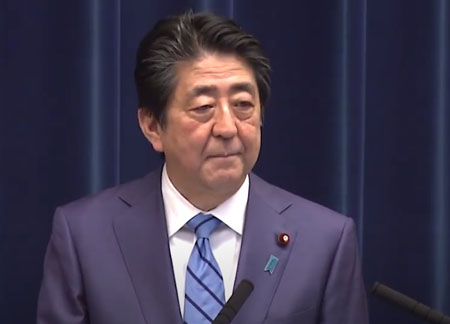by WorldTribune Staff, June 19, 2020
Japanese Prime Minister Shinzo Abe said Thursday that the country should consider acquiring preemptive strike capability amid ongoing regional threats, including escalating tensions on the Korean Peninsula. He made no specific mention of Chinese military aggression believed by analysts to have been a primary factor behind his statement.

Abe has long pushed to amend Article 9 of Japan’s post-World War II U.S.-drafted constitution, which renounced war and the use of force as a means of settling international disputes and has been interpreted as limiting the country’s armed forces to acting only in self-defense, The Associated Press reported.
Abe in 2015 reinterpreted Article 9 to allow self-defense to also include the right to fight back for its ally, the United States, in case of enemy attack.
Abe said the move should be considered after Japan scrapped the planned deployment of two new land-based missile defense systems.
The prime minister said he wants to redefine the meaning of deterrence in Japan’s pacifist constitution in the face of the threat from North Korea and its advancement in missile technology.
“We should renew our discussion of adequate deterrence we need, considering North Korea’s missile technology that has advanced since the time we introduced our missile defense systems,” he said.
Abe said that should include the capability to conduct preemptive strikes within the limitations set by the country’s pacifist constitution, the AP report said.
“The question is if we should stay within the boundary when enemy capability is dramatically advancing,” Abe said.
Abe’s made the comments just days after Japan’s Defense Ministry announced that it would “stop the deployment process” of two land-based Aegis Ashore missile defense systems after it was found that the safety of one of the planned host communities could not be ensured without a hardware redesign that would be too time consuming and costly.
Defense officials had said the two Aegis Ashore units could cover Japan entirely. The country’s current missile defenses consist of Aegis-equipped destroyers at sea and Patriot missiles on land.
Intelligence Brief __________ Replace The Media
